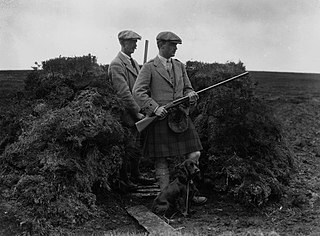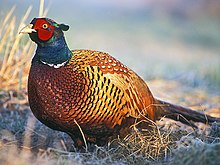
The Fire Services Act 1951 was an Act of the Parliament of the United Kingdom, which extended only to Great Britain.

The Short Titles Act 1892 is an Act of the Parliament of the United Kingdom. It authorised the citation of earlier Acts by short titles and collective titles. It is replaced by the Short Titles Act 1896.

Driven grouse shooting is the shooting of the red grouse and a field sport in the United Kingdom. The grouse-shooting season begins on 12 August, sometimes called the "Glorious Twelfth", ending on 10 December each year.

The Dogs Act 1871 is an Act of the Parliament of the United Kingdom which deals with the handling of stray and dangerous dogs.

The Criminal Justice Administration Act 1851 is an Act of the Parliament of the United Kingdom.

The Criminal Procedure Act 1853 is an Act of the Parliament of the United Kingdom. It makes provision for the giving of evidence by prisoners otherwise than at their own trial.

The Forgery Act 1830 was an Act of the Parliament of the United Kingdom. It consolidated into one Act all legislation imposing the death penalty for forgery. Two years later the death penalty was abolished for most of these offences, and for the remaining offences in 1837.

The Trials for Felony Act 1836 was an Act of the Parliament of the United Kingdom.

The Metropolitan Commons Act 1878 is an Act of the Parliament of the United Kingdom that amended the Metropolitan Commons Act 1866 and the Metropolitan Commons Amendment Act 1869.

The Metropolitan Commons Act 1866 is an Act of the Parliament of the United Kingdom that allowed local authorities within the area of the Metropolitan Police District around London, England to use income from rates to protect and maintain common lands in their areas. It was amended by the Metropolitan Commons Amendment Act 1869.

The Statute Law Revision Act 1875 is an Act of the Parliament of the United Kingdom. The Bill for this Act was the Statute Law Revision Bill.

The Statute Law Revision and Civil Procedure Act 1881 is an Act of the Parliament of the United Kingdom. The Bill for this Act was the Statute Law Revision and Civil Procedure Bill.

The Statute Law Revision Act 1892 is an Act of the Parliament of the United Kingdom. The Bill for this Act was the Statute Law Revision Bill 1892.

The Palatine Court of Durham Act 1889 was an Act of the Parliament of the United Kingdom. It was one of the Durham County Palatine Acts 1836 to 1889. The Bill for this Act was the Palatine Court of Durham Bill. Lely said that this Act was of practical utility.
Wildlife law in England and Wales is the law relating to the protection of wildlife in England and Wales. Much of existing UK law dates from pre-Victorian times. Wildlife was viewed as a resource to be used; phrases such as "game" or "sporting rights" appear. Public opinion is now much more in favour of protection of birds and mammals rather than the landowners’ interests.

The Criminal Procedure Act 1851 is an Act of the Parliament of the United Kingdom. It was drafted by Charles Sprengel Greaves. Stephen said that compared to earlier legislation on defects in indictments, the Criminal Procedure Act 1851 "went further in the way of removing technicalities, but it did so by an enumeration of them, so technical and minute, that no one could possibly understand it who had not first acquainted himself with all the technicalities which it was meant to abolish."

The Police Act 1919 was an Act of the Parliament of the United Kingdom which set up an alternative dispute resolution system within UK labour law for collective disputes involving members of staff in the police force. The current rules are now found under the Police Act 1996. Following the British police strikes in 1918 and 1919, the government decided that it was a threat to the public to allow strikes among the police force to take place. The Police Act 1919 prohibited police from joining a trade union that could take strike action protected by the Trade Disputes Act 1906, and provided an alternative in the Police Federation of England and Wales. A substitute for strikes was binding arbitration to resolve collective disputes.

The Public Stores Act 1875 is an Act of the Parliament of the United Kingdom which applied to all stores under the care of the Secretary of State, including "any public department or office, or of any person in the service of Her Majesty." Although in parts now superseded by subsequent legislation, or otherwise defunct, some sections are still in force. This includes a power of stop and search that is still available to police constables today.

The Metropolitan Police (Receiver) Act 1861 or the Metropolitan Police Receiver's Act 1861, sometimes called the Metropolitan Police District Receiver Act, was an Act of the Parliament of the United Kingdom. This Act has, in addition to its other short titles, been given the short title the Metropolitan Police Act 1861, but that short title has also been given to the Act 24 & 25 Vict. c. 51. The Metropolitan Police (Receiver) Act 1861 is one of the Metropolitan Police Acts 1829 to 1895.

The Prosecution of Offences Act 1879 was an act of the Parliament of the United Kingdom. It was one of the Prosecution of Offences Acts 1879 to 1908.






